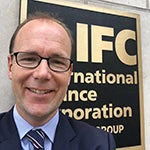
Institutional investors increasingly hold the world’s purse strings, with a growing share of private savings. What will it take for financiers to allocate more of that capital in ways that align with development goals—in the long-term investments, particularly in infrastructure, that are needed to help lift more people out of poverty and boost shared prosperity?
To answer that question, the World Bank Group and the Government of Argentina convened the first ever Investor Forum on the eve of the G20 Summit in Buenos Aires. The Investor Forum brought together investors holding over $20 trillion dollars of assets, finance experts, government representatives, and development partners for a frank and practical conversation.
The Opportunity
The good news is that many investors have an appetite to invest more in infrastructure, including in emerging markets. In preparation for the Forum, the World Bank Group interviewed senior executives from 34 global institutional investors—read more in the full report on the Landscape for Institutional Investing in 2018. Those executives told us that infrastructure investment is attractive for many reasons.
In the right environment, infrastructure assets can provide a hedge against inflation, generate stable cash flows, and help buffer returns in a financial crisis. Investors also see the bigger-picture need to invest in sustainable infrastructure to mitigate pressures in coming decades to adjust to global megatrends such as aging, migration, global warming, inequality and urbanization. Many respondents expressed that they would like to up their investment allocations to infrastructure but are struggling to find ways to do so.
The Constraints
What’s stopping investors from allocating more capital to sustainable infrastructure? Based on the interviews there are three main constraints. First, despite the scale of investment needs the pipeline of bankable projects is limited, with the aggravating perception that public investment sometimes crowds out the private sector. Second, investing in infrastructure in new and unproven investment environments entails high transaction costs, and can introduce uncertainty and risk that is difficult for investors to manage. Third, financial and prudential regulations disincentivize long-term investing by having high capital requirements, independent of the underlying investment risk.
Investing in emerging markets is particularly complex: with higher business, political, and currency risks, insufficient information about existing opportunities, and often a lack of institutional capacity in public and private contractual counterparts. Recognizing that this complexity will be a reality for the foreseeable future, many investors emphasized the importance of finding local partners in emerging markets who know how to navigate and manage the local political environment.
A Call to Action
The conversation in Buenos Aires focused on concrete actions that are needed to help overcome these constraints, brought together in a succinct Buenos Aires Call to Action with concrete steps that will help to drive collective action. In the infrastructure space, this call is directed in large part at the World Bank Group and other Development Finance Institutions (DFIs) to do more to crowd in private investment in the countries we work in. According to investors, what it will take is:
- Creating more investment opportunities in sustainable infrastructure: by scaling up our support to governments to develop bankable infrastructure investment programs and project pipelines—recognizing that this means focusing not just on defining and preparing projects that are investment-ready, but also on promoting institutional and policy reforms that improve the investment environment;
- Lowering the transaction costs of finding and assessing those opportunities, by sharing knowledge and data on infrastructure asset performance, and doing more to develop financial instruments and expand investment platforms that allow investors to join forces to invest in less-familiar environments; and
- Focusing our financial clout on mitigating risk, by scaling up use of guarantees and other credit enhancements; in particular for the political and policy risks that private investors find it hardest to bear.
The Investor Forum 2018 convened the top global institutional investors, select G20 Heads of State and Ministers of Finance, regulators and development finance institutions to discuss areas of collaboration that have the potential to significantly increase the flow of capital toward long-term sustainable investments in G20 markets and around the world. Two overarching themes were addressed during the Forum: (i) Sustainable long-term Investing: Rethinking Markets and Capital Allocation; and (ii) Scaling up infrastructure investments. This blog only deals with theme (ii) on infrastructure. For the full overview of the decisions reached, the key reference is the Buenos Aires Call to Action .



Join the Conversation